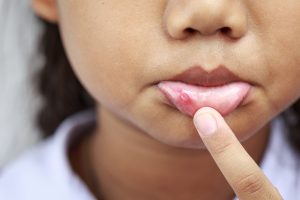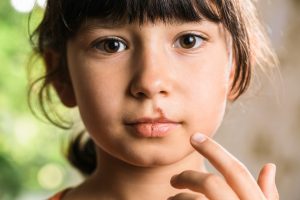Canker Sores and Cold Sores
Have you had a bothersome sore on your lip when an important event is about to take place? Not only are they annoying and painful, but many of them are contagious. Sores in the mouth can happen for several reasons. Today I will share information about two common types of sores, canker sores which are not contagious and cold sores which are very contagious. Anyone with little ones, especially newborns, must know how to identify and prevent the spread of these sores.

Canker sores or aphthous ulcers are usually a round pale yellow soft area that can be very uncomfortable. Sometimes these have a red ring around them, or they can be red. They can vary in size. Canker sores can be caused by trauma like biting a lip, tongue, or cheek or even hitting your gums or roof of the mouth with a toothbrush, sharp tortilla chips, or crusty French bread. These are not contagious. For some people, canker sores are not caused by trauma but by food, stress, and health issues.
Canker sores can come from eating foods like chocolate, acidic and spicy foods, coffee, eggs, and cheese, as well as stress and systemic issues. This could include vitamin deficiencies, like zinc, vitamin B-12, folate, and iron. Using tobacco products can also cause canker sores to develop. People with weak immune systems are more likely to experience these sores, as are people undergoing hormonal changes. Toothpaste with sodium Lauryl sulfate (SLS) can make some people suffer from these kinds of sores. For others, it might be certain medications like Nicorandil, Ibuprofen, and other anti-inflammatory medicines, nicotine replacement therapy, medicines that dissolve in the mouth, and cocaine. If you get canker sores often, it is best to talk to your primary care provider to rule out certain diseases like Crohn’s, Bechet’s, Celiac, and HIV/AIDS.
Always have any sore that lasts longer than two weeks checked by a doctor or dentist.
Here are some possible treatments for canker sores you can try for you and your kids (always check with your doctor first):
- Rinse mouth with a mixture of baking soda and water
- Rinse with warm salt water
- Put milk of magnesia on the sorer after rinsing
- Apply ice to the area helps with swelling
- Avoid spicy or acidic foods
- Ask your doctor to check your vitamin levels
- Vitamin B-12 melts
- Decrease stress
- Stay away from foods or medicines that you know cause these sores

The other sore I wanted to discuss is cold sores – also called fever blisters. These are tiny, fluid-filled blisters on and around your lips grouped in patches. A cold sore is caused by the herpes virus and is very contagious. About 50-80% of all adults have this virus, and once you have it, you will always have this virus living in your body. Some people will have outbreaks more often than others. For some, stress and sunlight will cause a sore to appear. And other people who have been exposed and have it in their body will never get a sore. I know, not fair!
The very first exposure and infection from the herpes virus can be painful and make you feel under the weather with flu-like symptoms, with a headache, fever, tiredness, lack of appetite, and many sores in the mouth and on the lips. Still, some people will not experience this. After the first outbreak, the next and recurrent ones are usually not as severe, but there will be blisters that will leak fluid. Usually, there is a tingling, itchy, and/or burning sensation before the sore appears. The entire time from when the sore appears to when it leaks and is healed can be very contagious.
Here are the main reasons that these sores continue to show up and bother us:
- Overall stress
- Menstruation
- Extreme exposure to sunlight
- A recent fever
- Physical injury to the area
- Surgery
For treatment options:
- Talk to your primary care provider about possible medications to prevent a recurrence.
- There are topical creams and ointments that can help the pain and help to heal. Some need to be applied as soon as you feel the tingling to work best.

Sharing cups, silverware, or anything that goes in the mouth or on the lips and kissing, any activity that shares saliva, can cause infection with the virus. This is especially important with babies under two months old, who are at higher risk for more severe outcomes when exposed to the herpes virus because their immune system is not mature yet and cannot fight viruses as easily as the rest of us. If you have herpes, talk with your pediatrician about best practices before and after your baby is born. You may want to ask friends and family to wait to kiss your baby until after two months, have them wash their hands, and stay away from big crowds during this time.
We all can agree that keeping our kids safe and well-loved is essential, and a few steps can help make this happen.